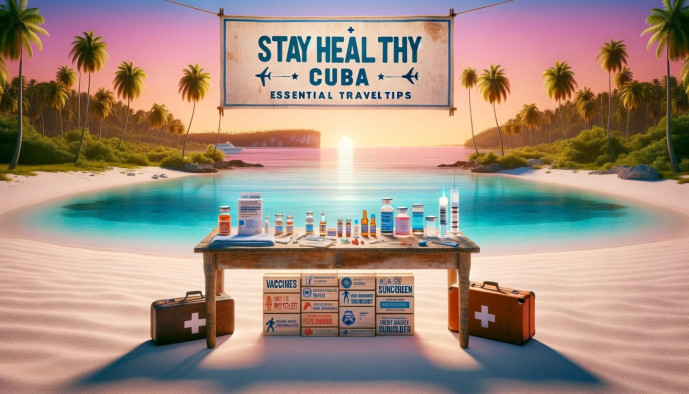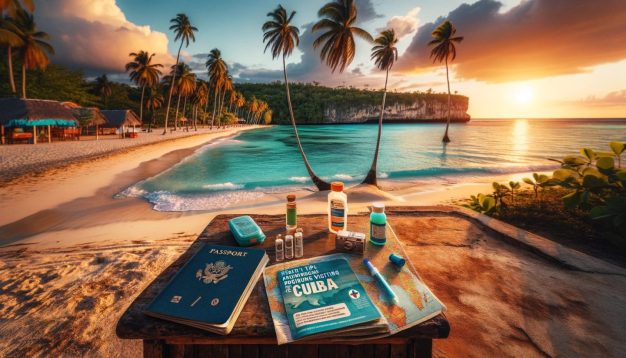Health in Cuba
Stay healthy in Cuba: health tips and advice for travelers

The Cuban Healthcare System is globally celebrated for its excellence, a testament to the Castro revolution’s emphasis on medical care alongside education. Its abundance of medical staff and facilities, coupled with an infant mortality rate that rivals that of many developed nations, continues to fuel national pride. However, the system is not without its flaws, as pharmacies frequently face critical shortages.
Pre-Trip Preparations
Consultation with a Travel Health Professional
Timing Your Health Consultation
Start your travel prep with a chat with your travel health guru (a.k.a. a travel health professional). The ideal time for this rendez-vous? At least 6-8 weeks before your departure. Why? Some vaccines need time to become effective, and others might require multiple doses.
What to Discuss: Vaccines, Prescriptions, and General Health
It’s like a health strategy session for your Cuban adventure. Discuss your overall health, any ongoing treatments, and yes, those vaccines.
Travel Insurance: Why It’s Essential for Cuba
Travel insurance isn’t just a ‘nice to have’; it’s a ‘must-have’. In Cuba, it’s actually mandatory. So, ensure your insurance policy covers medical expenses.
Vaccination
Mandatory Vaccinations for Entry into Cuba
Surprisingly, Cuba doesn’t have a list of mandatory vaccinations for entry. However, being up-to-date with routine vaccinations like measles, mumps, and rubella (MMR), diphtheria, tetanus, and pertussis (DTP), and polio is wise.
As of 06-04-2022, a negative PCR test is NOT required to enter Cuba, NOR is a vaccination certificate regardless of whether the traveler has recovered from Covid-19 or not.
Recommended Vaccinations for Optimal Protection
Routine Vaccines to Consider
These are your usual suspects: hepatitis A and B, typhoid, and rabies, especially if you’re going off the beaten track or planning to cuddle with Cuban wildlife.
General Health Tips
Navigating the Cuban Healthcare System
Public vs Private Healthcare in Cuba
Cuba’s healthcare system is renowned but remember, it’s different from what you’re used to. Public hospitals are free, even for foreigners, but facilities might be basic.
Emergency Services in Cuba: What to Expect
In case of emergencies, dial 104 for an ambulance. It’s reliable but might test your patience. Always have a backup plan, like knowing the location of the nearest clinic.
Dietary Do’s and Don’ts
Safe Eating and Drinking Practices
Indulge in Cuban cuisine, but do it wisely. Stick to hot, cooked foods and fruits you can peel. Remember, your stomach might not be as adventurous as you are.
Identifying and Avoiding Common Foodborne Illnesses
Foodborne illnesses can be sneaky. Symptoms include, but aren’t limited to, ‘tourista’ (traveler’s diarrhea). Stay hydrated, but with bottled or treated water only.
Heat and Hydration: Managing Cuba’s Tropical Climate
Cuba’s heat can knock you off your feet. Stay hydrated, wear light clothing, and maybe take a midday siesta like the locals. It’s the perfect time to plan your next excursion, maybe a guided tour of the lush tobacco fields in Pinar del Rio?

Mosquito-Borne Diseases
Prevention and Protection Against Mosquito Bites
Choosing the Right Insect Repellent
This isn’t the time for your ‘au naturel’ philosophy. Get a DEET-based repellent or one containing picaridin. Mosquitoes here aren’t just annoying; they’re carriers.
Clothing and Gear to Deter Mosquitoes
Long sleeves and pants are your friends, especially at dawn and dusk. Consider treating your clothes with permethrin for that extra layer of defense.
Understanding the Risks: Dengue, Zika, and Chikungunya
These aren’t just hard to pronounce; they’re hard on your health. There’s no vaccine, so prevention is your only cure. Keep those mosquitoes at bay, and stay informed about outbreaks.
Water and Sanitation
The Importance of Drinking Safe Water
Bottled vs Tap Water: Making the Right Choice
When in doubt, bottled is best. Tap
water might be treated, but your stomach might disagree. And hey, ‘agua sin gas’ or ‘con gas’ (still or sparkling) can be a conversation starter!
Sanitation Practices to Prevent Illness
Being cautious about hygiene is your secret weapon. Hand sanitizers and disinfectant wipes should be staples in your travel kit.
Sexual Health and Safety
Awareness and Prevention of Sexually Transmitted Infections (STIs)
Safe Sex Practices While Traveling
Cuba’s nightlife is tempting, but stay smart. Safe sex practices aren’t just a recommendation; they’re a must. Pack your own protection; don’t rely on finding it there.
Access to Sexual Health Resources in Cuba
Cuba is progressive in many ways, but access to sexual health resources can vary. Do your homework before you go.
Sun and Skin Protection
Choosing the Right Sunscreen
The Caribbean sun is no joke. Go for broad-spectrum sunscreen with at least SPF 30. Reapply, especially after a swim or a sweat session.
Protective Clothing and Accessories for Sun Exposure
Think hats, sunglasses, and UV-protective clothing. It’s not just fashion; it’s function.
Managing Chronic Conditions
Planning Ahead for Medication and Care
Bringing Medications to Cuba: Rules and Regulations
Stock up on your meds; getting them in Cuba could be challenging. Keep them in their original packaging to avoid any customs drama.
Accessing Pharmacies and Medical Supplies
Pharmacies in Cuba are different. Medications are often scarce, and the variety is limited. Bring a well-stocked first-aid kit, so you’re not scrambling for basics.